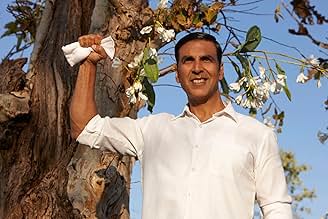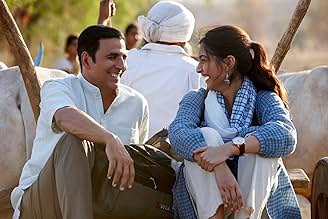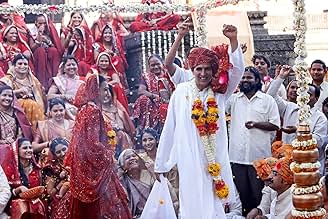Upon realizing the extent to which women are affected by their menses, a man sets out to create a sanitary pad machine and to provide inexpensive sanitary pads to the women of rural India.Upon realizing the extent to which women are affected by their menses, a man sets out to create a sanitary pad machine and to provide inexpensive sanitary pads to the women of rural India.Upon realizing the extent to which women are affected by their menses, a man sets out to create a sanitary pad machine and to provide inexpensive sanitary pads to the women of rural India.
- Awards
- 4 wins & 8 nominations total
- Director
- Writers
- All cast & crew
- Production, box office & more at IMDbPro
Storyline
Did you know
- TriviaBased on the life of Tamil Nadu-based social activist Arunachalam Muruganatham, who revolutionized the concept of menstrual hygiene in rural India by creating a low-cost sanitary-napkin machine.
- GoofsThe film is set in 2001, but Sonam uses a present-day smartphone.
- Quotes
Lakshmikant Chauhan: Bloody men... half hour... half hour bleeding like women... they straight dying!
- Crazy creditsAfter the last shot, the photograph of Mr. Arunachalam Muruganantham, on whose life this film is based, is shown with the title "PadMan".
- ConnectionsFeatured in 64th Vimal Elaichi Filmfare Awards (2019)
Featured review
There's a montage sometime in the first hour where the central character approaches women from different walks of life but finds it difficult to convince even one of them to try out his indigenous product. Reason? The touchy subject. Padman aspires to break this stigma associated with the subject of menstrual hygiene. From a delivery point of view, it is roaring succes.
Akshay Kumar plays Lakshmi, a simple, uneducated man living with his mother, two sisters, and newly-wedded wife, Gayatri. A bit of an oddball in his thought processes, he makes it his life goal to produce low-cost sanitary napkins when he learns about the hard-up conditions that Gayatri and the women around him including his sisters, who have recently hit puberty live in, when it comes to menstruation. The religious aspect of the issue - where menstruating women are supposed to isolate themselves and live outside the house during the cycle (mostly in rural India) because they are considered impure - also bothers him, which is why Padman looks like it has been written with a complete contemplation of the issue. And, for a person, who has been exposed to high-octane, mindless Bollywood potboilers, this can come as a surprise.
Padman, therefore, is a critique of our times when a technically developed country like India that aspires to be digital-ready struggles with something as crucial and necessary as menstrual sanitation. Lakshmi's attempts to educate the people around him and fight the stigma that is stuck like the plague is much more important than to invent a low-cost napkin that is both efficient and cheap. Despite being a little bit successful in the latter department, Lakshmi continuously struggles to remove the preconceptions about menstruation that people have and which they are not ready to talk about. This hesitance to converse about an issue that is tied to a woman's innate health is alarming, and Padman tries to preach about that. Of course, it's a preach, but a social film cannot do without it if it intends to send the point across. Considering that director R Balki is targeting rural India with this film, I am personally content and confident that it will tick.
It is because of not just the construction of the sanitary pad but also the construction of the screenplay that this works. Padman excels in all departments, also giving intermediate knowledge about napkins if people don't know about it already. A well-written plot that reminds us of Shree Narayan Singh's 2017 hit drama on a similar social issue, 'Toilet - Ek Prem Katha', also starring Kumar, it moves ahead without hitting a bump. Of course, there are sequences that are sometimes cringe-worthy and sometimes impossible, but director Balki has evidently taken a lot of cinematic liberty, which is mandatory for a film that captures the entire essence of a social predicament such as this. The fact that Padman is based on the real-life story of the Indian inventor, Arunachalam Muruganantham, would make the viewer more confident and supportive of the structure. It's well-written, has good amounts of humour and drama, if not melodrama, and hits the right notes with its messages. With a score that supports the inspirational message, Padman must be viewed on the big screen and be marketed through word of mouth as it demands greater viewership.
Akshay Kumar is phenomenal and looks like he came directly out of the aforementioned film's sets. He carries the whole film on his shoulders and never once shows an inkling of restfulness. If there is a character that I feel an actor has done complete justice to in any film in the past few months, it'd be that of Lakshmi. Equally enchanting is the supremely talented Radhika Apte's performance who seems to be made just for the role of the village wife, something that we previously saw her do in Kabali (2016), and Parched (2015) and Manjhi: The Mountain Man (2015) before that. There's not a single dull moment in Padman, thanks to the performances of the lad and the supporting cast. Sonam Kapoor and Amitabh Bachchan grace the screen for some time and do a decent job, but it is the supporting actors that make the whole broth tastier.
Similar to how we last saw in R S Prasanna's Shubh Mangal Savdhan (2017), another highlight of Padman is in its dialogues and general writing. Talking about a touchy subject like menstruation is already an exercise, but to make an entire feature film about it, without hitting the awkward and/or obscene point even once, is something of a marvel. Director-writer Balki and co-writer Swanand Kirkire need to be appreciated for the sensitivity that is visible throughout the film, which could have been turned into a vulgar mess had it been executed by some of the more energetic yesteryear Bollywood filmmakers. Padman excels for a lot of reasons, but tailoring it for a conservative audience is one of the major ones.
Padman is refreshing because it serves several things on a single plate and yet manages to not overload it. Lakshmi's relentless attitude towards innovation makes this film much more than something about a social cause. Although India is known as the innovators' world, we hardly see such immaculate representation of the same on the silver screen. I don't care much more for the promotional angle of this film, courtesy the current ruling government in India, but as something that is important to mankind, Padman does deserve applause for its pure concoction and filmmaking brilliance. There couldn't be a better time to release this film that even has shades of chivalry (which, spare me the rolling eye, is no longer dead), feminism, and women empowerment. Lakshmi's dream must have taken him to a lot of places, but his underlying thought to not commercialize his invention and instead work for the greater good is something that makes Padman much more effective and deserving of attention.
There's a good chance that if one can relate to the subject, tears are going to make a guest appearance at least once in the 140-minute running time. But, even if that does not happen, it will touch your heart through its warm characterization, entrepreneurship, and the sheer ability to pump your beat up. Padman is perhaps R Balki's best film so far, something that I would even go as far as to list in Kumar's filmography as well. TN.
Akshay Kumar plays Lakshmi, a simple, uneducated man living with his mother, two sisters, and newly-wedded wife, Gayatri. A bit of an oddball in his thought processes, he makes it his life goal to produce low-cost sanitary napkins when he learns about the hard-up conditions that Gayatri and the women around him including his sisters, who have recently hit puberty live in, when it comes to menstruation. The religious aspect of the issue - where menstruating women are supposed to isolate themselves and live outside the house during the cycle (mostly in rural India) because they are considered impure - also bothers him, which is why Padman looks like it has been written with a complete contemplation of the issue. And, for a person, who has been exposed to high-octane, mindless Bollywood potboilers, this can come as a surprise.
Padman, therefore, is a critique of our times when a technically developed country like India that aspires to be digital-ready struggles with something as crucial and necessary as menstrual sanitation. Lakshmi's attempts to educate the people around him and fight the stigma that is stuck like the plague is much more important than to invent a low-cost napkin that is both efficient and cheap. Despite being a little bit successful in the latter department, Lakshmi continuously struggles to remove the preconceptions about menstruation that people have and which they are not ready to talk about. This hesitance to converse about an issue that is tied to a woman's innate health is alarming, and Padman tries to preach about that. Of course, it's a preach, but a social film cannot do without it if it intends to send the point across. Considering that director R Balki is targeting rural India with this film, I am personally content and confident that it will tick.
It is because of not just the construction of the sanitary pad but also the construction of the screenplay that this works. Padman excels in all departments, also giving intermediate knowledge about napkins if people don't know about it already. A well-written plot that reminds us of Shree Narayan Singh's 2017 hit drama on a similar social issue, 'Toilet - Ek Prem Katha', also starring Kumar, it moves ahead without hitting a bump. Of course, there are sequences that are sometimes cringe-worthy and sometimes impossible, but director Balki has evidently taken a lot of cinematic liberty, which is mandatory for a film that captures the entire essence of a social predicament such as this. The fact that Padman is based on the real-life story of the Indian inventor, Arunachalam Muruganantham, would make the viewer more confident and supportive of the structure. It's well-written, has good amounts of humour and drama, if not melodrama, and hits the right notes with its messages. With a score that supports the inspirational message, Padman must be viewed on the big screen and be marketed through word of mouth as it demands greater viewership.
Akshay Kumar is phenomenal and looks like he came directly out of the aforementioned film's sets. He carries the whole film on his shoulders and never once shows an inkling of restfulness. If there is a character that I feel an actor has done complete justice to in any film in the past few months, it'd be that of Lakshmi. Equally enchanting is the supremely talented Radhika Apte's performance who seems to be made just for the role of the village wife, something that we previously saw her do in Kabali (2016), and Parched (2015) and Manjhi: The Mountain Man (2015) before that. There's not a single dull moment in Padman, thanks to the performances of the lad and the supporting cast. Sonam Kapoor and Amitabh Bachchan grace the screen for some time and do a decent job, but it is the supporting actors that make the whole broth tastier.
Similar to how we last saw in R S Prasanna's Shubh Mangal Savdhan (2017), another highlight of Padman is in its dialogues and general writing. Talking about a touchy subject like menstruation is already an exercise, but to make an entire feature film about it, without hitting the awkward and/or obscene point even once, is something of a marvel. Director-writer Balki and co-writer Swanand Kirkire need to be appreciated for the sensitivity that is visible throughout the film, which could have been turned into a vulgar mess had it been executed by some of the more energetic yesteryear Bollywood filmmakers. Padman excels for a lot of reasons, but tailoring it for a conservative audience is one of the major ones.
Padman is refreshing because it serves several things on a single plate and yet manages to not overload it. Lakshmi's relentless attitude towards innovation makes this film much more than something about a social cause. Although India is known as the innovators' world, we hardly see such immaculate representation of the same on the silver screen. I don't care much more for the promotional angle of this film, courtesy the current ruling government in India, but as something that is important to mankind, Padman does deserve applause for its pure concoction and filmmaking brilliance. There couldn't be a better time to release this film that even has shades of chivalry (which, spare me the rolling eye, is no longer dead), feminism, and women empowerment. Lakshmi's dream must have taken him to a lot of places, but his underlying thought to not commercialize his invention and instead work for the greater good is something that makes Padman much more effective and deserving of attention.
There's a good chance that if one can relate to the subject, tears are going to make a guest appearance at least once in the 140-minute running time. But, even if that does not happen, it will touch your heart through its warm characterization, entrepreneurship, and the sheer ability to pump your beat up. Padman is perhaps R Balki's best film so far, something that I would even go as far as to list in Kumar's filmography as well. TN.
- How long is Pad Man?Powered by Alexa
Details
- Release date
- Countries of origin
- Official site
- Language
- Also known as
- Padman
- Filming locations
- Production companies
- See more company credits at IMDbPro
Box office
- Gross US & Canada
- $1,670,192
- Opening weekend US & Canada
- $740,313
- Feb 11, 2018
- Gross worldwide
- $29,045,020
- Runtime2 hours 20 minutes
- Color
- Sound mix
- Aspect ratio
- 2.35 : 1
Contribute to this page
Suggest an edit or add missing content




































